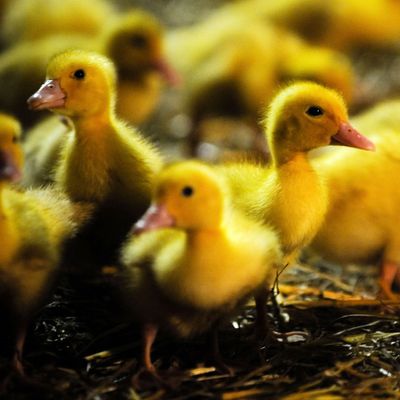
As far as famous science experiments go, this is certainly one of the cutest: In the mid-20th century, the Austrian animal behaviorist Konrad Lorenz spent several years studying geese by pretending to be their mother, leading around lines of baby birds that waddled behind him. Even after they grew into adulthood, his avian research subjects held on to the bonds they’d formed with him in the first moments of their lives.
Lorenz, who would go on to win a 1973 Nobel Prize, built much of his career on the study of imprinting — the irreversible process in which newborn ducks and geese identify their mothers by latching on to the very first thing they see. And in a study on ducklings published today in the journal Science, a pair of Oxford researchers shed some light on how it happens: The baby ducks can juggle multiple abstract concepts at once, making them the first animals to demonstrate that level of thinking without any training from humans.
As the New York Times reported:
First, they took 1-day-old ducklings and exposed them to a pair of moving objects. The two objects were either the same or different in shape or color. Then they exposed each duckling to two entirely new pairs of moving objects.
The researchers found that about 70 percent of the ducklings they studied preferred to move toward the pair of objects that had the same shape or color relationship as the first objects they saw. A duckling that was first shown two green spheres, in other words, was more likely to move toward a pair of blue spheres than a mismatched pair of orange and violet spheres.
Past research, the Times noted, has found “that other animals, including pigeons, dolphins, honeybees and some primates, can discern same from different,” but all displayed the ability to do so only after being taught. But ducklings, the authors of the Nature study argued, do it naturally from the moment they come into the world. “Even in a seemingly rigid and very rapid form of learning such as filial imprinting, the brain operates with abstract conceptual reasoning, a faculty often assumed to be reserved to highly intelligent organisms.”
Broadly speaking, this is one more piece of evidence to suggest we don’t know as much as we think we do about animal intelligence — as study co-author Antone Martinho III told the Times, this conceptual reasoning “is far more necessary to a wider variety of animals’ survival than we previously thought.” Let’s just hope that future research on the subject continues to come with videos of baby ducks chasing things.




